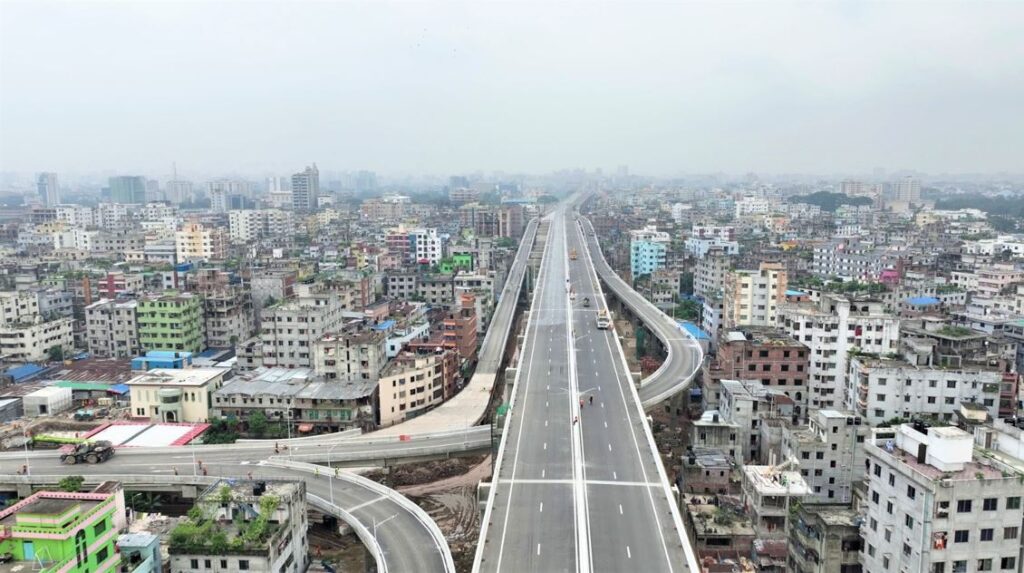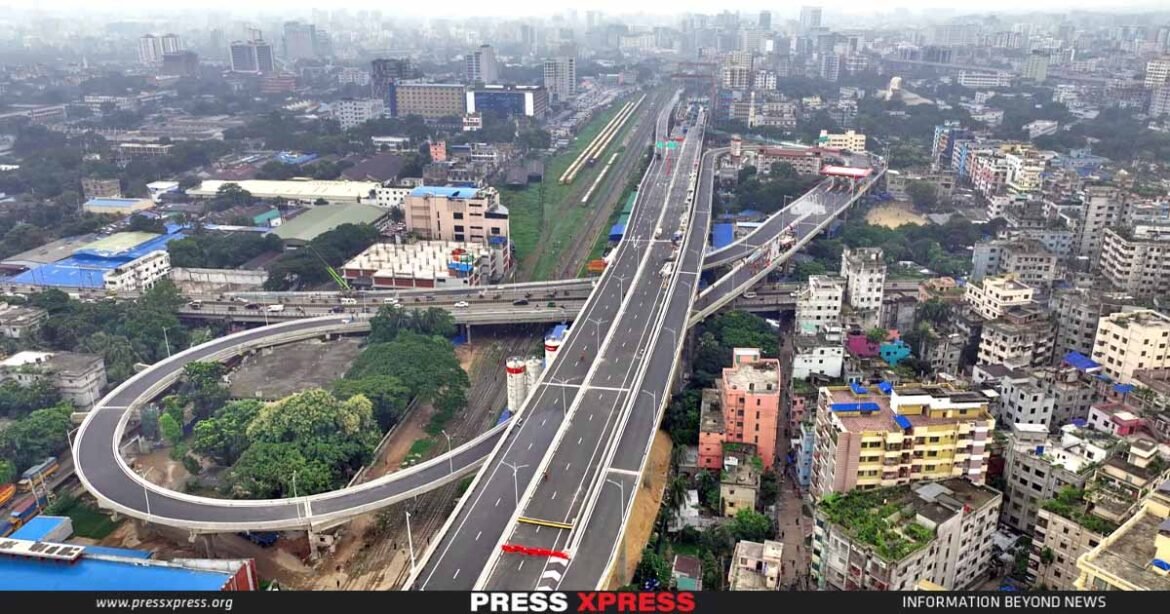Under the strong leadership of Prime Minister Sheikh Hasina, Bangladesh is making remarkable strides on the path of development. Despite numerous hurdles, these ambitious projects continue to advance. Following the inauguration of the Padma Setu (Bridge) last year, the Metrorail took its inaugural journey, the Dhaka Elevated Expressway was unveiled today
The Dhaka Elevated Expressway was officially opened by Prime Minister Sheikh Hasina, marking a significant milestone in the city’s transportation infrastructure. The inauguration ceremony took place at 3:35 PM on a Saturday, ushering in a new era of elevated expressways for the capital’s residents. This mega project is expected to substantially alleviate the persistent traffic congestion that has plagued Dhaka’s roadways.
Prime Minister Sheikh Hasina, following her prior inaugurations of the Padma Bridge and Metro Rail, unveiled yet another monumental project. During the ceremony, Bridges Secretary Manjur Hossain provided the Prime Minister with a comprehensive overview of the project. Accompanying the Prime Minister were her younger sister, Sheikh Rehana, and Awami League General Secretary Obaidul Quader. Following the inauguration of the elevated expressway, the Prime Minister’s motorcade proceeded to a rally near the Bangabandhu International Conference Centre. The journey of the Dhaka Elevated Expressway, which began with the initial agreement signed on January 19, 2011, has encountered numerous challenges and triumphs. The full inauguration, spanning from Kawla to Qutubkhali, is scheduled for June 2024. Until then, traffic will be able to traverse up to Farmgate
You can also read: Country’s first underwater expressway ‘Bangabandhu Tunnel’ awaits unveiling

Notable figures such as Mayor of Dhaka North City Corporation Atiqul Islam, Bridges Secretary Md. Manjur Hossain, Project Director AHMS Akhtar, and other project stakeholders were present at the inauguration ceremony. While the inauguration occurred today, traffic on the expressway will commence at 6 am on the following Sunday, September 3.
During his visit to the gathering place yesterday, Road Transport and Bridges Minister Obaidul Quader expressed optimism that the partial opening of the Dhaka Elevated Expressway would alleviate some traffic congestion. He highlighted that this new development would enable travelers to cover the distance from Kawla to Farmgate Tejgaon railway station in just 10 to 11 minutes, a significant benefit for the capital’s residents.
Minister Quader also emphasized the broader advantages being reaped by the country’s populace, such as the ongoing benefits from the Padma Bridge and the operational metro rail service from Uttara to Agargaon. He noted that the forthcoming extension of the metro rail service to Motijheel in October would further contribute to easing traffic and reducing the current gridlock.
While acknowledging that a complete solution to Dhaka’s traffic woes might not be attainable immediately, Minister Quader remained optimistic about gradual improvements. He envisioned a more modern city for Dhaka when all metro rail lines and the elevated expressway become fully operational.


Furthermore, Minister Quader asserted that public support for the Awami League had grown significantly, citing the substantial turnout in their rallies held across the country, including various cities. He emphasized their commitment to showcasing their accomplishments rather than mere rhetoric, with expectations of robust public participation in tomorrow’s event as well.
Dhaka Elevated Expressway (Kawla-Farmgate Section)
This particular segment of the expressway spans approximately 11.5 kilometers and is equipped with 15 boarding ramps. Notably, the Banani and Mohakhali ramps will remain temporarily closed, while the remaining 13 ramps are open for use. The maximum permissible speed limit for vehicles on this expressway is set at 60 kilometers per hour.
The following vehicles and activities are prohibited on the expressway
- Three-wheelers, motorcycles, bicycles, and pedestrians are not permitted to use the expressway
- Stopping and taking pictures at any point along the expressway is not allowed
- Only buses, trucks, and four-wheeled private cars or vehicles with four or more wheels are allowed to operate on the expressway
Toll Rates for the Elevated Expressway Range from 80 to 400 Taka
The government has recently determined the toll charges for using the Dhaka Elevated Expressway. The toll fees are structured with a minimum of 80 Taka and a maximum of 400 Taka, depending on the type of vehicle. Road Transport and Bridges Minister Obaidul Quader unveiled these toll rates during a presentation at the secretariat last Sunday.

For the 11 and a half kilometers journey from Kawla to Farmgate, stretching from Hazrat Shahjalal International Airport, the toll rates are as follows: Private cars, microbuses, and minitrucks are charged at 80 Taka, while buses and minibusses are subject to a fee of 160 Taka. Medium trucks will be required to pay 320 Taka, and for large trucks, the toll stands at 400 Taka.
It’s important to note that the expressway enforces a maximum speed limit of 60 kilometers per hour. Additionally, two or three-wheeler vehicles, including CNG-powered autorickshaws, are not permitted to use this flyover, and the movement of motorcycles will be temporarily suspended.
Dhaka Elevated Expressway: A Monumental Infrastructure Endeavor
The construction of the Dhaka Elevated Expressway, aimed at ensuring seamless traffic flow from the northern to the southern regions of Dhaka city, commenced in June 2011. This ambitious project was initially slated for completion by 2016 under the framework of a Public-Private Partnership (PPP). However, due to a multitude of challenges, including alterations in runway designs, complications related to land acquisition, and financial constraints, the completion deadline has been extended multiple times.

Following the groundbreaking ceremony for the project, the original completion target was set for 2017 but was subsequently pushed to 2018. Subsequently, it faced further delays, extending to 2022. Regrettably, the construction was not finished by this fourth deadline, prompting yet another extension to June 2023. Nevertheless, the latest deadline now stands at June 2024 for the entire project’s completion.
Initially, the construction cost of the flyover was estimated at 8,703 crores Taka. By 2013, it had risen to 8,940 crores Taka, and with the project’s prolonged duration, including additional taxes and VAT, the total project cost had surged to 16,070,713,000 Taka.
First Dhaka Elevated Expressway (FDEE) Company Limited is the principal investing entity, comprising a 51 percent stake held by Italian Thai Development Public Company Limited, 34 percent by China Shandong International Economic and Technical Cooperation Group (CSI), and 15 percent by Sinohydro Corporation Limited.
This Public-Private Partnership (PPP)-based initiative will span from South Kawla of Hazrat Shahjalal Airport and extend to Kutubkhali on the Dhaka-Chittagong highway, traversing through Kuril, Banani, Mohakhali, Tezgaon, Mogbazar, Malibag, Khilgaon, and Kamalapur.
The elevated expressway is poised to serve as a vital north-south thoroughfare in Dhaka, offering a direct connection from Hemayetpur, Kadamtali, Nimtali, Sirajdikhan, Madanganj, and the Dhaka-Chittagong highway to Madanpur.
Dhaka-Ashulia Elevated Expressway
It’s worth noting that the Dhaka-Ashulia Elevated Expressway was inaugurated by the Prime Minister on November 12, 2022. The construction of this 24-kilometer expressway comes with an estimated expenditure of 17,553 crores and 4 lakh taka.
Upon its completion, this expressway will seamlessly link Hazrat Shahjalal International Airport to Abdullahpur, Ashulia, Bypail, and Dhaka Export Processing Zones along the Nabinagar-Chandra highway. It will facilitate swift entry and exit from the capital and extend connectivity up to Qutubkhali in the Jatrabari police station of Dhaka.

More than four crore people spanning 30 districts, including North Bengal, stand to benefit from this expressway. Furthermore, it will significantly streamline the transportation of both people and goods, contributing to quicker and more efficient movement while alleviating traffic congestion.
Projections for the expressway project anticipate a 0.217 percent growth in the gross domestic product (GDP). China is set to provide the majority of the project’s funding.


